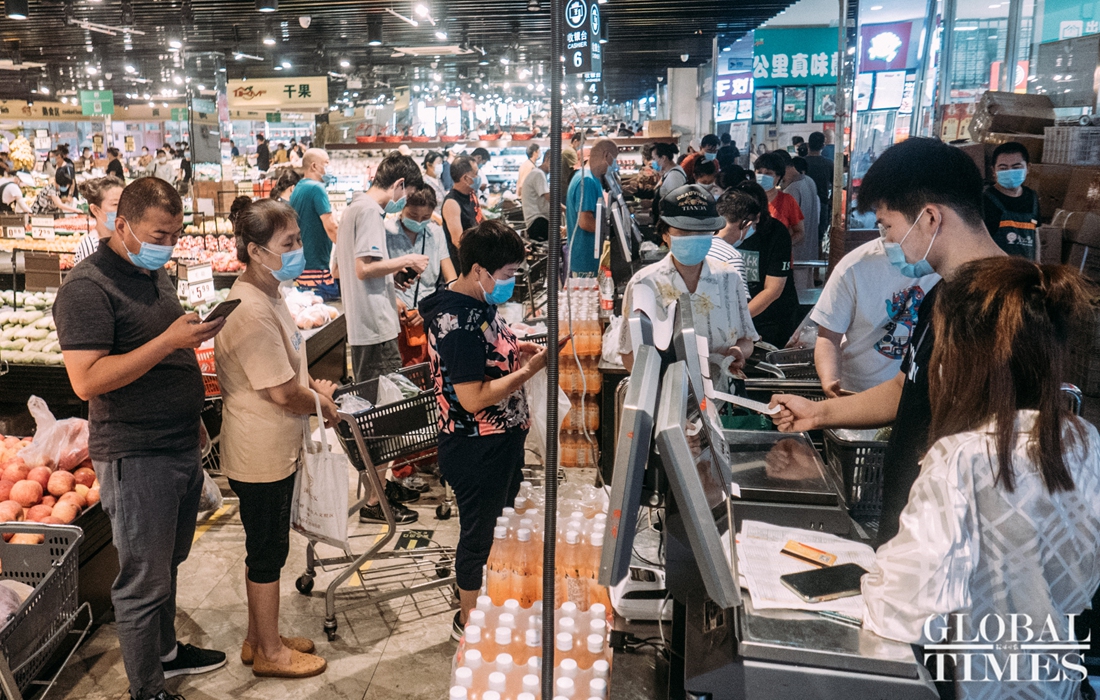Virologists rebuke seafood markets becoming suspicious COVID-19 hot spots after cases test positive in Beijing market
By Liu Caiyu and Zhang Hui Source:Global Times Published: 2020/6/13 18:29:51

Photo: Li Hao/GT
Beijing’s seafood markets have entered the public spotlight after two confirmed cases along with 45 merchants in relation to a local market tested positive for COVID-19, with many discussing the reasoning behind seafood markets becoming hot spots for the novel coronavirus.
The COVID-19 outbreak in Wuhan, the capital city of Hubei Province, was reportedly first detected in the Huanan seafood market in the city, and this new discovery of confirmed cases and quite a many positive nucleic acid tests in Beijing are also closely related to seafood markets.
Seafood markets are generally referred to as markets that sell seafood, however such places usually don’t sell only seafood but also other meats - beef and lamb, for example. But like food markets, seafood markets are more susceptible to the novel coronavirus due to its humid environment and large flow of customers, Yang Zhanqiu, deputy director of the pathogen biology department at Wuhan University, told the Global Times on Saturday.
Similar to the Huanan seafood market in Wuhan, the Xinfadi Market in Beijing also found positive samples for the novel coronavirus, but we cannot draw the conclusion that seafood markets have become hot spots for novel coronavirus, Yang said, as the investigation in Beijing’s Xinfadi market is still ongoing.
The COVID-19 tests showed that 40 environmental samples collected from Xinfadi Market in Beijing’s Fengtai district, the largest food wholesale market in the capital city, came back positive for the virus, and samples collected from other markets and supermarkets were negative.
Some of the positive samples are from chopping boards used to process the salmon, some are not, said Gao Xiaojun, a spokesman for the Beijing Municipal Health Commission.
Previously, Zhang Yuxi, head of the Beijing Xinfadi Market, had revealed that the novel coronavirus was detected on chopping boards used by a seller of imported salmon at Xinfadi Market. The seller’s salmon was from the Fengtai district’s Jingshen seafood market.
In an inspection conducted by specialists from the Beijing disease control and prevention departments on Friday among local wholesale markets and large supermarkets in the city, a total of 5424 samples such as seafood, meat and the outer environment were collected.
As the source of infection in Xinfadi Market still remains unknown, people should not overreact over safety of food markets in the city, experts called. Evidence also showed that Beijing’s wet markets usually have clean sanitation and no animals from the wildlife trade, live poultry trade or animals slaughtered on site were found.
The outbreak of the novel coronavirus in Wuhan also had a close relation with the local Huanan seafood market in the city, as investigation revealed, there had been illegal sales of wild animals. But no evidence showed the Huanan seafood market being the origin of COVID-19.
Thirty-three of the 585 environmental samples collected at the Huanan seafood market were found to contain novel coronavirus, the Chinese Center for Disease Control said in January.
Samples in the environment regarding chopping boards, gloves, and door stoppers in Wuhan’s Huanan seafood market were tested as having the novel coronavirus but the exact source is still unclear, a report by China Newsweek said on Saturday.

Photo:Li Hao/GT
According to the Beijing government’s press conference on Saturday, of the 517 samples taken at the Xinfadi Market, throat swabs from 45 individuals tested positive for the virus. Another person from a local food market in Beijing’s Haidian district also tested positive.
Merchants in seafood markets are more likely to make physical contacts with contaminated food, either seafood or other meats, meaning they are more likely to be infected than ordinary people, Yang noted.
These cases may have come into contacts with the polluted environment in the market or infected people, and the possibility of further cases of COVID-19 cannot be ruled out, officials said at the Saturday press conference in Beijing.
Beijing’s Xinfadi Market enters the public spotlight after two cases who are colleagues from the China Meat Food Comprehensive Research Center in Beijing's Fengtai District, about 6 kilometers away from Xinfadi market, were reportedly confirmed with COVID-19 on Friday.
One of the confirmed cases from the center has been to the market to conduct supervision and another confirmed case reported on Thursday had also been to the beef and lamb trade center of Xinfadi market to purchase food.
The beef and lamb trading hall mainly sells beef and mutton, poultry meat, aquatic products and spices. The Xinfadi Market is more of a one-stop-shop where wholesalers in the city would purchase vegetables, meat and seafood hall after hall.
The fear regarding salmon and seafood being a source of infection causes a series of aftershocks.
But Yang believed there is no possibility that the seafood itself, including salmon, can carry the novel coronavirus, as seafood is usually shipped refrigerated from overseas, but seafood can be contaminated by other means in the outer environment by the process of transportation or packaging.
The virus has rarely been transmitted to humans from fish, he said.
Jin Dongyan, a professor with the School of Biomedical Sciences at the University of Hong Kong, also said there is no evidence that the virus can replicate in fish, which means that the possibility of salmon itself being a viral carrier is very small.
To ensure food safety, after Beijing closed about six major wholesale food markets to curb the viral spread, the wholesale market center of agricultural products in Chengdu, Southwest China's Sichuan Province announced to remove salmon from Saturday.
A Nanjing restaurant association in East China’s Jiangsu Province also issued a proposal to suspend raw seafood supply.
Posted in: SOCIETY,FOCUS